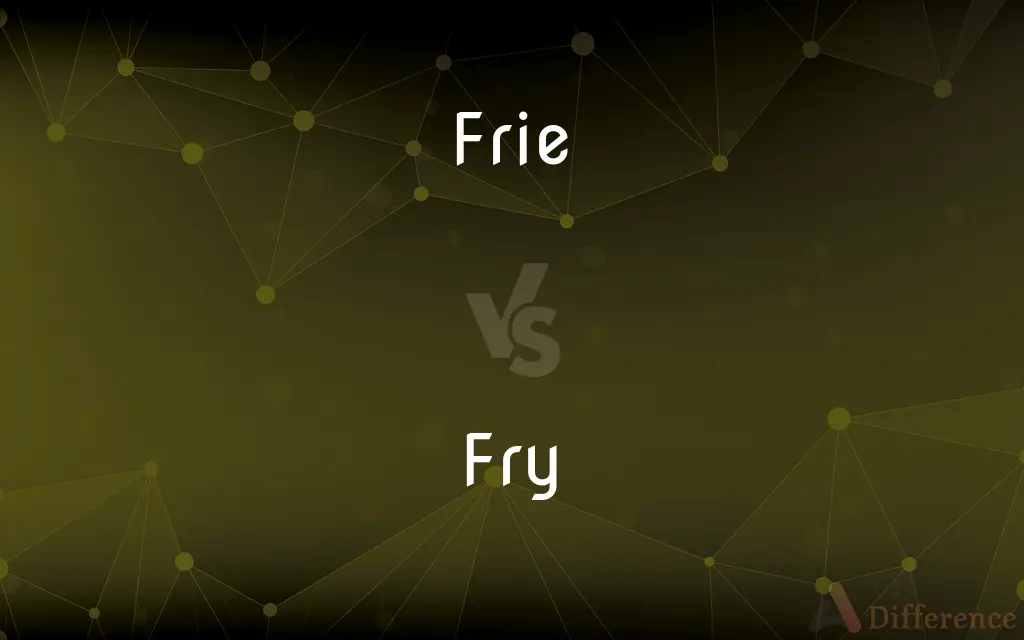Frie vs. Fry — Which is Correct Spelling?
By Tayyaba Rehman & Urooj Arif — Updated on March 31, 2024
"Frie" is a misspelling, while "Fry" is correct. "Fry" refers to cooking food in hot fat or oil, typically quickly at high heat.

Table of Contents
Which is correct: Frie or Fry
How to spell Fry?

Frie
Incorrect Spelling

Fry
Correct Spelling
ADVERTISEMENT
Key Differences
Think of "fry" like "sky," both have the 'y' at the end.
"I before E except after C," so "Frie" is generally incorrect.
Associate "Fry" with "French fries," a common fried food.
Remember, "Y" is for "yellow," the color of many fried foods.
Visualize "Fry" in a pan, with the letter 'Y' as the handle.
ADVERTISEMENT
How Do You Spell Fry Correctly?
Incorrect: They decided to frie the fish they caught in the lake.
Correct: They decided to fry the fish they caught in the lake.
Incorrect: She wanted to frie some eggs for breakfast.
Correct: She wanted to fry some eggs for breakfast.
Incorrect: I don't like to frie foods too often because it's unhealthy.
Correct: I don't like to fry foods too often because it's unhealthy.
Incorrect: Can we frie the chicken instead of baking it?
Correct: Can we fry the chicken instead of baking it?
Incorrect: The dog loves to frie in the sun.
Correct: The dog loves to fry in the sun.
Fry Definitions
Fry involves cooking food in hot fat or oil, usually resulting in a crispy texture.
She decided to fry the chicken for dinner.
Fry can denote small or young animals of other species, not just fish.
The fry were protected by their mother in the wild.
In slang, fry means to destroy or damage with electricity.
He managed to fry his computer by spilling water on it.
To cook over direct heat in hot oil or fat.
(Slang) To destroy (electronic circuitry) with excessive heat or current
"a power surge to the computer that fried a number of sensitive electronic components" (Erik Sandberg-Diment).
To be cooked in a pan over direct heat in hot oil or fat.
(Slang) To undergo execution in an electric chair.
A french fry
Ordered fries as a side dish.
A dish of a fried food.
A social gathering at which food is fried and eaten
A fish fry.
A recently hatched fish.
A young salmon living in fresh water that is older than an alevin and younger than a parr or smolt.
A young animal of certain other groups, such as frogs.
Pl. fry or fries An individual, especially a young or insignificant person
"These pampered public school boys ... had managed to evade the long prison sentences that lesser fry were serving" (Noel Annan).
A method of cooking food.
(transitive) To cook (something) in hot fat.
I am frying the eggs.
(intransitive) To cook in hot fat.
The eggs are frying.
(obsolete) to simmer; to boil
To be affected by extreme heat or current.
To suffer because of too much heat.
You'll fry if you go out in this sun with no sunblock on.
To be executed by the electric chair. Category:en:Capital punishment
He's guilty of murder — he's going to fry.
To destroy (something, usually electronic) with excessive heat, voltage, or current.
If you apply that much voltage, you'll fry the resistor.
A fried piece of cut potato.
A meal of fried sausages, bacon, eggs, etc.
The liver of a lamb.
A lamb or calf testicle.
A state of excitement.
To be in a fry
Young fish; fishlings.
Offspring; progeny; children; brood.
(archaic) A swarm, especially of something small.
A fry of children
The spawn of frogs.
A kind of sieve.
A drain.
To cook in a pan or on a griddle (esp. with the use of fat, butter, or olive oil) by heating over a fire; to cook in boiling lard or fat; as, to fry fish; to fry doughnuts.
To undergo the process of frying; to be subject to the action of heat in a frying pan, or on a griddle, or in a kettle of hot fat.
To simmer; to boil.
With crackling flames a caldron fries.
The frothy billows fry.
To undergo or cause a disturbing action accompanied with a sensation of heat.
To keep the oil from frying in the stomach.
To be agitated; to be greatly moved.
What kindling motions in their breasts do fry.
A dish of anything fried.
A state of excitement; as, to be in a fry.
The young of any fish.
A swarm or crowd, especially of little fishes; young or small things in general.
The fry of children young.
To sever . . . the good fish from the other fry.
We have burned two frigates, and a hundred and twenty small fry.
English painter and art critic (1866-1934)
English dramatist noted for his comic verse dramas (born 1907)
A young person of either sex;
She writes books for children
They're just kids
`tiddler' is a British term for youngsters
Be excessively hot;
If the children stay out on the beach for another hour, they'll be fried
Cook on a hot surface using fat;
Fry the pancakes
Kill by electrocution, as in the electric chair;
The serial killer was electrocuted
Fry refers to young, small fish, recently hatched.
The pond was teeming with fry in the spring.
In informal terms, to fry means to be in severe trouble or face consequences.
He knew he was going to fry for breaking the window.
Fry Meaning in a Sentence
Be careful when you fry food; the oil can splatter.
Mom is going to fry chicken for dinner tonight.
On hot days, it feels like you could fry an egg on the sidewalk.
Fry the onions until they are golden brown.
If you fry the potatoes, they'll be crispy and delicious.
To fry the perfect steak, you need a really hot pan.
It's amazing how quickly you can fry bacon and have it ready to eat.
She prefers to fry fish with a little bit of flour on it.
Fry the chicken wings until they're crispy on the outside.
I learned how to fry shrimp from my grandmother.
You can fry tofu for a vegetarian meal.
Can you fry an egg without breaking the yolk?
Let's fry some donuts for a special treat.
We're going to fry some green tomatoes as a side dish.
Can you fry these sausages for breakfast?
I want to learn how to fry rice like they do in restaurants.
Fry the spices for a few minutes to release their flavors.
Can we fry some marshmallows over the fire?
I like to fry mushrooms and add them to my burgers.
He decided to fry some vegetables for a healthy dinner option.
I love to fry apples with cinnamon for a dessert.
To make a good stir-fry, you have to fry the ingredients quickly on high heat.
It's his turn to fry the pancakes this morning.
They fry the turkey every Thanksgiving.
When you fry zucchini, it becomes surprisingly tasty.
Fry Idioms & Phrases
A bigger fish to fry
Having more important things to deal with.
I can't worry about that now; I have bigger fish to fry.
To fry your brain
To cause oneself to become confused or unable to think clearly, often from excessive study or drug use.
Studying for finals non-stop is going to fry your brain.
Stir-fry
A method of cooking food quickly by cutting it into small pieces and frying it quickly over high heat.
Let's make a chicken stir-fry for dinner tonight.
Small fry
Someone or something that is considered unimportant.
In the grand scheme of things, our problems are just small fry.
Common Curiosities
What is the pronunciation of Fry?
Fry is pronounced as /fraɪ/.
What is the root word of Fry?
The root word of "fry" is the Old French word "frire."
Which vowel is used before Fry?
Typically, any vowel can be used before "fry" depending on the context, but there's no specific rule for a particular vowel.
What is the plural form of Fry?
The plural form is "fries."
Which preposition is used with Fry?
Common prepositions used with "fry" include "in" and "with," as in "fry in oil" or "fry with butter."
Which conjunction is used with Fry?
Conjunctions like "and" or "or" can be used, as in "fry and stir" or "fry or bake."
What is the verb form of Fry?
The verb form is "fry."
Why is it called Fry?
The term "fry" is derived from the Old French word "frire," which means to cook food in hot fat or oil.
What is the singular form of Fry?
The singular form is "fry."
Is Fry an adverb?
No, "fry" is not an adverb.
Is Fry an abstract noun?
No, "fry" is not an abstract noun; it is a concrete noun when referring to food.
Is the word Fry Gerund?
Yes, when used as a noun to refer to the act of frying, e.g., "Frying is easy."
What is the first form of Fry?
The first form (present tense) is "fry."
Is Fry a negative or positive word?
"Fry" is neutral; it is neither inherently negative nor positive.
Is Fry a countable noun?
Yes, when referring to individual pieces of fried food, "fry" is countable (e.g., fries).
Is Fry a collective noun?
No, "fry" is not typically used as a collective noun.
Is the word Fry imperative?
"Fry" can be used as an imperative verb in commands, e.g., "Fry the chicken."
How many syllables are in Fry?
There is one syllable in "fry."
How do we divide Fry into syllables?
Since "fry" has only one syllable, it is not divided.
What is a stressed syllable in Fry?
The entire word "fry" is stressed, as it is a single-syllable word.
Is Fry a vowel or consonant?
The word "fry" begins with a consonant.
What is another term for Fry?
Another term for "fry" could be "sauté" or "deep-fry," depending on the method.
Which determiner is used with Fry?
Determiners like "some," "any," "the," "a," or "an" can be used with "fry."
What is the second form of Fry?
The second form (simple past tense) is "fried."
What is the third form of Fry?
The third form (past participle) is also "fried."
Is Fry a noun or adjective?
"Fry" can be both a noun (as in "a batch of fry") and a verb (as in "to fry something"). It is not typically used as an adjective.
Is the Fry term a metaphor?
"Fry" is not commonly used as a metaphor.
Is the word “Fry” a Direct object or an Indirect object?
"Fry" can be a direct object in a sentence, e.g., "I will fry the fish." It is not used as an indirect object.
Which article is used with Fry?
The definite article "the" or the indefinite articles "a" or "an" can be used, depending on the context.
What part of speech is Fry?
"Fry" can be a verb or a noun.
What is the opposite of Fry?
The opposite of "fry" could be "boil" or "bake," depending on the context.
How is Fry used in a sentence?
Example: "She decided to fry the chicken for dinner."
Share Your Discovery

Previous Comparison
Handleing vs. Handling
Next Comparison
Hankerchief vs. HandkerchiefAuthor Spotlight
Written by
Tayyaba RehmanTayyaba Rehman is a distinguished writer, currently serving as a primary contributor to askdifference.com. As a researcher in semantics and etymology, Tayyaba's passion for the complexity of languages and their distinctions has found a perfect home on the platform. Tayyaba delves into the intricacies of language, distinguishing between commonly confused words and phrases, thereby providing clarity for readers worldwide.
Co-written by
Urooj ArifUrooj is a skilled content writer at Ask Difference, known for her exceptional ability to simplify complex topics into engaging and informative content. With a passion for research and a flair for clear, concise writing, she consistently delivers articles that resonate with our diverse audience.


































